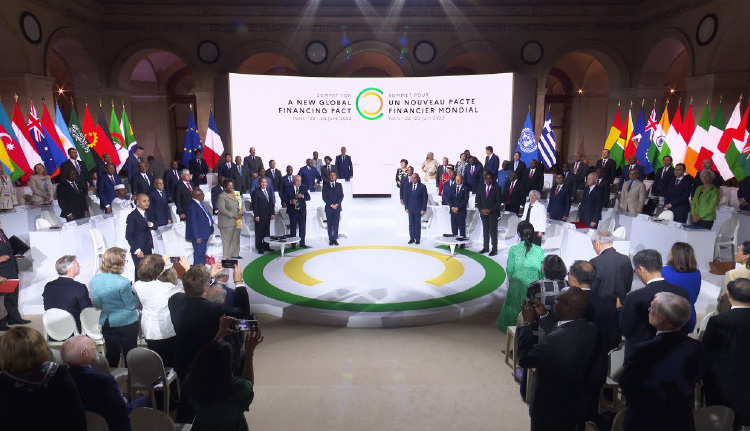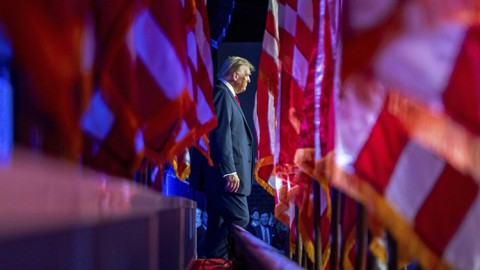In a message to leaders participating in the New Global Financing Pact Summit, Egyptian President Abdel Fattah El-Sisi urged rich and developed countries, which possess the technology and knowledge, to shoulder the responsibility towards others, which do not possess this technology.
The President’s remarks matched a strategy of action declared by French President Emmanuel Macron which relies on leveraging all sources of finance, development assistance, and private investments.
Macron hosted the summit on June 22-23 in Paris “to rethink the global financial architecture” and to mobilize financial support for developing and low-income countries (DLICs), which are in distress, facing the challenges posed by excessive debt, climate change, and poverty.
During the summit, around 40 leaders, many from the Global South, were given the chance to debate changes to multilateral financial institutions in the face of climate change and other development challenges.
During his participation, President El-Sisi has shown determination to focus on various issues of prime concern to the developing nations, pertaining to bolstering the international efforts to facilitate their access to the required financial flaws amid the challenges they suffer as a result of the escalating global crises.
The Egyptian President also referred to the potential positive impact that a fulfilled $100-billion climate finance pledge by developed nations to developing nations could have had on climate change results, reiterating the necessity of offering the developing states active support to help them achieve the 2030 Sustainable Development Goals (SDGs).
The Summit gave the floor to several vulnerable countries to showcase their cause and put more pressure on international financial institutions, including World Bank and International Monetary Fund (IMF) to boost climate change finance. Leaders insisted that the World Bank and other multilateral financial institutions needed a new vision, especially in light of the war in Ukraine, the climate crisis, and declining progress.
They were joined in their attack on financial institutions by the United Nations Secretary-General Antonio Guterres, who indicated that “It is clear that the international financial architecture has failed in its mission to provide a global safety net for developing countries.” The UN Chief even described the current financial system as “outdated, dysfunctional, and unjust.”
In response to the debate, a new vision was revealed to squeeze more financing from multilateral lenders for the countries that need it most.
There was some good news for those needy countries as World Bank said it would ease financing for countries hit by natural disasters, while the IMF announced it had hit its target of making $100 billion in special drawing rights available for vulnerable nations.
US Treasury Secretary Janet Yellen said that proposed reforms to the lending practices of international development banks could unlock $200bn in new funds over the next decade.
For his part, Macron called for a “public finance shock” and stressed the need to address the world’s challenges without having to choose between reducing poverty and protecting the planet.
Barbados Prime Minister Mia Mottley advocated for an absolute transformation of the global financial system to help developing countries invest in clean energy and boost climate resilience, while Guterres urged a $500 billion stimulus per year for sustainable development and climate action.
Many observers think that the summit has failed to bridge the gap between the countries of the global North and South or even to deliver significant headline announcements. However, other observers see that the real value of the summit was offering a platform for leaders from the Global South to articulate their desires for reform. It also presented a roadmap requiring specific actions by specific dates. Additionally, the summit prepared the floor for more detailed discussions during important events later in the year, including the IMF and World Bank annual meetings, a G20 meeting in September in India, and the COP28 climate talks in Dubai.
A statement by the Elysee described the summit as a historic event on international solidarity, defining its prime goal as a “world where poverty is eliminated and the planet preserved; a world where vulnerable countries are better equipped to face the crises from climate change and conflicts.”
The statement indicated that this goal can be achieved by leveraging all sources of finance, including official development assistance, domestic resources, and private investment.
Engaging the private sector was one of the new ideas that was deemed necessary for meeting global challenges, which will crucially depend on the scaling up of private capital flows to transform emerging and developing economies, for a net-zero and nature-positive world and to reduce inequalities more efficiently.
However, one of the most important results of the summit is this agreement among participants that no country should have to choose between fighting poverty and fighting for the planet.







